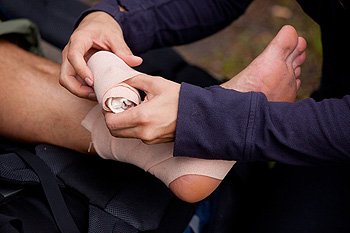April 2021
Fungus Can Cause Plantar Warts
 A lesion on the bottom of the foot may be referred to as a plantar wart. This is defined as a wart that grows inward, and can happen as a result of the pressure the feet endure on a daily basis. It is caused by a viral infection, and can cause severe pain and discomfort. The fungus that often precedes this infection lives in warm environments, including public pools, shower room floors, and surrounding areas. A plantar wart appears as a small, hardened area of skin that has black dots in the center. Patients have felt mild relief when a cushioned pad is used in the shoe, which may help to alleviate a portion of the pressure. If you have a plantar wart, it is strongly suggested that you consult with a podiatrist as quickly as possible who can offer the right treatments for you.
A lesion on the bottom of the foot may be referred to as a plantar wart. This is defined as a wart that grows inward, and can happen as a result of the pressure the feet endure on a daily basis. It is caused by a viral infection, and can cause severe pain and discomfort. The fungus that often precedes this infection lives in warm environments, including public pools, shower room floors, and surrounding areas. A plantar wart appears as a small, hardened area of skin that has black dots in the center. Patients have felt mild relief when a cushioned pad is used in the shoe, which may help to alleviate a portion of the pressure. If you have a plantar wart, it is strongly suggested that you consult with a podiatrist as quickly as possible who can offer the right treatments for you.
Plantar warts can be very uncomfortable. If you need your feet checked, contact the podiatrists from New England Family Foot Care. Our doctors will assist you with all of your foot and ankle needs.
About Plantar Warts
Plantar warts are the result of HPV, or human papillomavirus, getting into open wounds on the feet. They are mostly found on the heels or balls of the feet.
While plantar warts are generally harmless, those experiencing excessive pain or those suffering from diabetes or a compromised immune system require immediate medical care. Plantar warts are easily diagnosed, usually through scraping off a bit of rough skin or by getting a biopsy.
Symptoms
- Lesions on the bottom of your feet, usually rough and grainy
- Hard or thick callused spots
- Wart seeds, which are small clotted blood vessels that look like little black spots
- Pain, discomfort, or tenderness of your feet when walking or standing
Treatment
- Freezing
- Electric tool removal
- Laser Treatment
- Topical Creams (prescription only)
- Over-the-counter medications
To help prevent developing plantar warts, avoid walking barefoot over abrasive surfaces that can cause cuts or wounds for HPV to get into. Avoiding direct contact with other warts, as well as not picking or rubbing existing warts, can help prevent the further spread of plantar warts. However, if you think you have developed plantar warts, speak to your podiatrist. He or she can diagnose the warts on your feet and recommend the appropriate treatment options.
If you have any questions please feel free to contact our office located in Milton, MA . We offer the newest diagnostic and treatment technologies for all your foot and ankle needs.
How Appropriate Footwear Reduces the Risk of Falling for Older Adults
Because older adults often deal with balance and mobility issues, their risk of falling is increased. Proper footwear can help reduce that risk, even in those with diabetes, arthritis and neurodegenerative diseases. High heels and sling-back or backless shoes can be particularly hazardous as they reduce a person’s ability to maintain balance. While older adults with diabetes or foot pain are often more familiar with foot care practices, all older adults can benefit from contacting a podiatrist to learn more about foot and ankle health and what shoes are best for improving balance and reducing their risk of falling and serious injury.
Preventing falls among the elderly is very important. If you are older and have fallen or fear that you are prone to falling, consult with the podiatrists from New England Family Foot Care. Our doctors will assess your condition and provide you with quality advice and care.
Every 11 seconds, an elderly American is being treated in an emergency room for a fall related injury. Falls are the leading cause of head and hip injuries for those 65 and older. Due to decreases in strength, balance, senses, and lack of awareness, elderly persons are very susceptible to falling. Thankfully, there are a number of things older persons can do to prevent falls.
How to Prevent Falls
Some effective methods that older persons can do to prevent falls include:
- Enrolling in strength and balance exercise program to increase balance and strength
- Periodically having your sight and hearing checked
- Discuss any medications you have with a doctor to see if it increases the risk of falling
- Clearing the house of falling hazards and installing devices like grab bars and railings
- Utilizing a walker or cane
- Wearing shoes that provide good support and cushioning
- Talking to family members about falling and increasing awareness
Falling can be a traumatic and embarrassing experience for elderly persons; this can make them less willing to leave the house, and less willing to talk to someone about their fears of falling. Doing such things, however, will increase the likelihood of tripping or losing one’s balance. Knowing the causes of falling and how to prevent them is the best way to mitigate the risk of serious injury.
If you have any questions, please feel free to contact our office located in Milton, MA . We offer the newest diagnostic and treatment technologies for all your foot care needs.
Do Your Child's Feet Hurt?
Why You Should See a Podiatrist for an Ankle Sprain
 Ankle sprains occur when the ligaments which connect the bones in the ankle become overstretched or even torn. This is often a result of the ankle being twisted. Ankle sprains can range from mild, where the ankle is tender and swollen, to severe, where the ankle is unstable and unable to bear weight. Ankle sprains should be treated by a podiatrist because recurring or severe sprains can result in long term weakness and joint pain in the ankle. Depending on the severity of the sprain, a podiatrist may take X-rays of the ankle to make sure there are no broken bones. A podiatrist will also be able to guide the recovery and rehabilitation of the ankle sprain.
Ankle sprains occur when the ligaments which connect the bones in the ankle become overstretched or even torn. This is often a result of the ankle being twisted. Ankle sprains can range from mild, where the ankle is tender and swollen, to severe, where the ankle is unstable and unable to bear weight. Ankle sprains should be treated by a podiatrist because recurring or severe sprains can result in long term weakness and joint pain in the ankle. Depending on the severity of the sprain, a podiatrist may take X-rays of the ankle to make sure there are no broken bones. A podiatrist will also be able to guide the recovery and rehabilitation of the ankle sprain.
Ankle sprains are common but need immediate attention. If you need your feet checked, contact the podiatrists from New England Family Foot Care. Our doctors can provide the care you need to keep you pain-free and on your feet.
How Does an Ankle Sprain Occur?
Ankle sprains take place when the ligaments in your ankle are torn or stretched beyond their limits. There are multiple ways that the ankle can become injured, including twisting or rolling over onto your ankle, putting undue stress on it, or causing trauma to the ankle itself.
What Are the Symptoms?
- Mild to moderate bruising
- Limited mobility
- Swelling
- Discoloration of the skin (depending on severity)
Preventing a Sprain
- Wearing appropriate shoes for the occasion
- Stretching before exercises and sports
- Knowing your limits
Treatment of a Sprain
Treatment of a sprain depends on the severity. Many times, people are told to rest and remain off their feet completely, while others are given an air cast. If the sprain is very severe, surgery may be required.
If you have suffered an ankle sprain previously, you may want to consider additional support such as a brace and regular exercises to strengthen the ankle.
If you have any questions please feel free to contact our office located in Milton, MA . We offer the newest diagnostic and treatment technologies for all your foot and ankle needs.
What Kind of Shoes Should My Child Wear?
Since many foot problems in children are due to ill-fitting or improper footwear, it’s important to make sure your child wears the right shoes. Check the fit on their shoes every 3-4 months to make sure they haven’t outgrown them. Avoid shoes that are too inflexible, tight, or hand-me-downs—all of which can change the shape of your child’s feet. Babies learning to walk should be barefoot indoors or have on soft-soled shoes to build up muscles and allow toes to grip the floor. Small children should wear non-synthetic, breathable shoes that are flexible and adjustable for a secure fit with a round toe box. Soles should be smooth and not overly grippy—which can alter a child’s gait and restrict their ability to move properly. If you notice any irregularities in the structure of your child’s foot or their gait, make an appointment with a podiatrist for a full examination.
Making sure that your children maintain good foot health is very important as they grow. If you have any questions, contact the podiatrists of New England Family Foot Care. Our doctors can provide the care you need to keep you pain-free and on your feet.
Keeping Children's Feet Healthy
Having healthy feet during childhood can help prevent medical problems later in life, namely in the back and legs. As children grow, their feet require different types of care. Here are some things to consider...
Although babies do not walk yet, it is still very important to take care of their feet.
Avoid putting tight shoes or socks on his or her feet.
Allow the baby to stretch and kick his or her feet to feel comfortable.
As a toddler, kids are now on the move and begin to develop differently. At this age, toddlers are getting a feel for walking, so don’t be alarmed if your toddler is unsteady or ‘walks funny’.
As your child gets older, it is important to teach them how to take care of their feet.
Show them proper hygiene to prevent infections such as fungus.
Be watchful for any pain or injury.
Have all injuries checked by a doctor as soon as possible.
Comfortable, protective shoes should always be worn, especially at play.
If you have any questions please feel free to contact our office located in Milton, MA . We offer the newest diagnostic and treatment technologies for all your foot and ankle needs.











